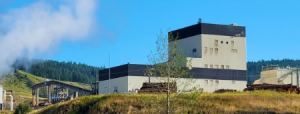
WILLIAMS LAKE – The Cariboo Regional District’s (CRD) is calling on the provincial government and BC Hydro to expedite a new deal to secure jobs at a local power plant.
The Williams Lake Power Plant (WLPP) is a biomass-fueled electricity generating station owned by Atlantic Power that has been in operation in Williams Lake since 1993. WLPP uses wood waste from mills and logging operations in the region to produce enough electricity to supply around 52,000 homes in B.C. The power plant employs approximately 30 staff and contracts with over 50 suppliers and vendors, for a combined total of approximately 100 local jobs. It is also the largest single taxpayer in the City of Williams Lake, providing $1.7 million in tax revenue each year.
“Premier David Eby has expressed numerous times that our electrical system in the north needs more clean energy to support economic growth for the entire Province,” said Margo Wagner, Chair of the CRD’s Board of Directors. “It’s extraordinarily counter intuitive to cause the closure of an existing facility that already checks these boxes and produces huge benefits for its host community simply by refusing to negotiate a reasonable agreement.”
Rising costs to transport wood waste from farther away, declining waste wood volumes from local mills, and a threatened timber supply are all translating into higher costs to operate the WLPP. While Atlantic Power has an agreement with BC Hydro until October 2029, failing to revise it could close the WLPP doors as early as late 2025.
“The impact in Williams Lake and surrounding area will be devastating to local services and to everyone who chooses to live, work, and play in the Cariboo,” said Melynda Neufeld, Vice-Chair of the CRD and a long-time resident of Williams Lake.
This has been a hot topic of discussion at many Council and Board meetings in Williams Lake, and elected officials will continue to advocate for an agreement to be reached between Atlantic Power and BC Hydro. The WLPP also plays a massive role in wildfire mitigation by using wood that would otherwise be burned in slash piles or left on the ground to rot or burn. Instead, WLPP can take this otherwise decaying waste biomass and convert it into a clean energy source. Because of roadblocks in the approval process to gain access to fibre sources, WLPP is running out of fibre to process, leading to the potential closure of the plant.
Source: cariboord.ca

